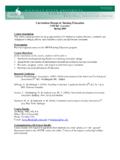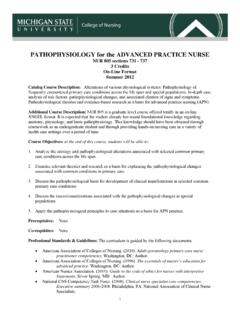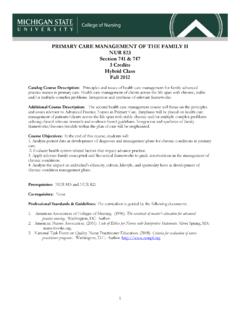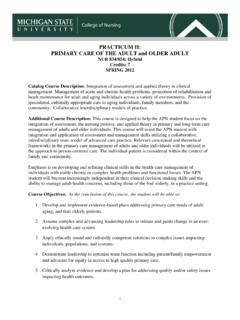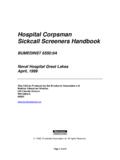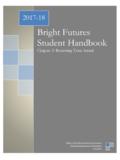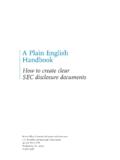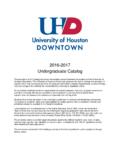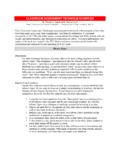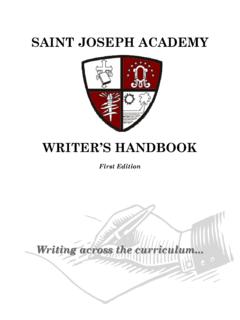Transcription of Practicum I: Primary Care for the Adult and Aged
1 Practicum I: Primary care for the Adult and Aged NUR 832 6 Credit Hours Fall, 2011 course Description: Integration of assessment and applied theory in clinical care management of the Adult and aged. Health promotion/wellness, health maintenance/management and risk reduction strategies. Acute conditions. Interpretation and integration of various forms of patient health data. Collaborative, collegial model of practice. course Objectives: 1. Conduct advanced assessments, apply therapeutic reasoning and critical thinking to determine diagnoses when providing care to Adult and aging individuals related to health promotion/wellness, disease prevention and/or acute conditions commonly encountered in these patient populations.
2 2. Apply appropriate diagnostic and therapeutic intervention regimens that reflect issues related to safety, cost, simplicity, acceptability, efficacy and patient goals. 3. Incorporate culturally and spiritually appropriate resources into the planning and delivery of health care . 4. Utilize advanced independent nursing interventions for management of health/illness states. 5. Initiate strategies to facilitate interdisciplinary partnerships and team functioning. 6. Integrate appropriate models and frameworks applicable to care of adults and the aged in development of holistic and comprehensive management plans.
3 7. Evaluate outcomes and effectiveness of care of the APN. 8. Utilize the clinical therapeutic reasoning process in the management of Adult and aged individuals including documentation of assessment data, the medical and nursing diagnoses, the management plan and the individual and/or caregiver outcomes. 9. Analyze caseload data to determine student patterns of practice in clinical practice. 10. Demonstrate progression in level of clinical decision-making. 11. Communicate data on patients/residents.
4 12. Assume leadership in implementing educational strategies. 13. Provide health promotion and disease prevention services based on age, gender, h ealth risk, ethnicity and cultural background. Prerequisites: NUR 815 and NUR 835 and NUR 836 Co-requisites: None Professional Standards & Guidelines: The curriculum is guided by the following documents: 1. American Association of Colleges of Nursing. (2010). Adult -gerontology Primary care nurse practitioner competencies. Washington, DC: Author.
5 2. American Association of Colleges of Nursing. (1996). The essentials of master s education for advanced practice. Washington, DC: Author. 3. American Nursing Association. (2011). Guide to the code of ethics for nurses with interpretive statements. Silver 4. Spring, MA: Author. 5. Southern Regional Education Board. (2002). Nurse educator competencies. Atlanta, GA: Author. 6. National League for Nursing. (2004). The scope of practice for nurse educators. New York City, NY: Author.
6 7. National Task Force on Quality Nurse Practitioner Education. (2008). Criteria for evaluation of nurse practitioner programs. Washington, DC: Author. Faculty Section 741: Patty Peek, RN, MS, PNP-BC course Coordinator Contact Information: A224 Life Sciences, 517-432-1162; Office Hours: please e-mail to arrange Note: Times can be arranged to accommodate student schedules. Faculty Section 741: Mary Jane Cook, MSN, FNP-BC Contact Information: Office hours: please call or e-mail to arrange Note: Times can be arranged to accommodate student schedules.
7 Faculty Section 741: Kathy Dontje, PhD, RNP-BC, CFNP Contact Information: A207 Life Sciences, 517-432-0023; Office Hours: please call or e-mail to arrange Note: Times can be arranged to accommodate student schedules. Faculty Section 741: Ann Edwards, MSN, RN, ANP Contact Information; Office Hours: please call or e-mail to arrange Note: Times can be arranged to accommodate student schedules. Faculty Section 741: Denise Hershey, PhD, FNP Contact Information: 416B West Fee Hall, 517-432-8294; Office Hours: please call or e-mail to arrange Note: Times can be arranged to accommodate student schedules.
8 Faculty Section 741: Carol Hill, MSN, RN, FNP Contact Information: Office hours: please call or e-mail to arrange Note: Times can be arranged to accommodate student schedules. Faculty Section 741: Kara Schrader, RN, MSN, NP-C Contact Information: Office hours: please call or e-mail to arrange Note: Times can be arranged to accommodate student schedules. Faculty Section 741: Mary Smania, MSN Contact Information: Office hours: please call or e-mail to arrange Note: Times can be arranged to accommodate student schedules.
9 Instruction: a. Methodology: Overview: As Adult learners, it is expected that students will do relevant reading and study prior to clinical and clinical conference on topic areas identified. Faculty directed readings and web links will be provided for specific content areas when needed. It is expected that students will search the literature and suggest/share relevant findings with faculty and classmates. Case presentations, peer review, and other methods determined by the faculty will be the basis for this guided cooperative discussion.
10 Guidelines for class interactions and specific methodology are located on ANGEL, course Information. There are a number of different learning modalities in this course including clinical Practicum , clinical conferences (on-campus, webcam, online), discussion, portfolio development and a learning assessment center experience. Required Texts: American Psychological Association. (2010). Publication manual of the American Psychological Association (6th ed.). Washington, DC: Author.
